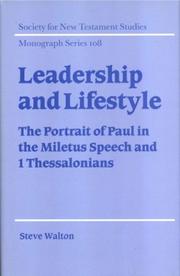| Listing 1 - 2 of 2 |
Sort by
|

ISBN: 1107119936 0511009739 1280429070 0511172575 0511151403 0511310609 051148819X 0511049986 9780511009730 0511034733 9780511034732 9780511488191 0521780063 9780521780063 9781107119932 9781280429071 9780511172571 9780511151408 9780511310607 9780511049989 9780521036382 0521036380 Year: 2000 Volume: 108 Publisher: Cambridge: Cambridge university press,
Abstract | Keywords | Export | Availability | Bookmark
 Loading...
Loading...Choose an application
- Reference Manager
- EndNote
- RefWorks (Direct export to RefWorks)
This study contributes to debate about the portraits of Paul in Acts and his epistles by considering Paul's Miletus speech (Acts 20.18b-35) and identifies and compares major themes in Luke and Paul's views of Christian leadership. Comparisons with Jesus' speeches in Luke show how Lukan the speech is and, with 1 Thessalonians, how Pauline it is. The speech calls the Ephesian elders to service after Paul's departure to Jerusalem, focusing on: faithful fulfilment of leadership responsibility; suffering; attitudes to wealth and work; and the death of Jesus. Paul models Christian leadership for the elders. Parallels in Luke highlight his view of Christian leadership - modelled by Jesus and taught to his disciples, and modelled by Paul and taught to the elders. Study of 1 Thessalonians identifies a remarkably similar portrait of Christian leadership. The Miletus speech is close in thought, presentation and vocabulary to an early, indubitably Pauline letter.
Leadership --- Biblical teaching. --- Paul, --- Pavel, --- Pavol, --- Paulus, --- Paulos, --- Pōghos, --- Paweł, --- Pawełm --- Būlus, --- Pablo, --- Paulo, --- Paolo, --- Pál, --- Apostolos Paulos --- Saul, --- القديس بولس الرسول --- بولس، --- 사도바울 --- Bible. --- Thessalonians 1 (Book of the New Testament) --- Criticism, interpretation, etc. --- 227*0 --- 227.1*7 --- 227.1*7 Brieven van Paulus aan de Thessalonicenzen --- Brieven van Paulus aan de Thessalonicenzen --- 227*0 Leven van Paulus --- Leven van Paulus --- Biblical teaching --- Paul [Apostle] --- Bible NT. Acts of the Apostles --- Bible NT. Epistles of Paul. `Thessalonians 1-2 --- Bible. N.T. Acts XX, 18-35 --- Criticism, interpretation, etc --- Bible. N.T. Thessalonians, 1st --- Paul --- Paul, - the Apostle, Saint. --- Bible. - N.T. - Acts XX, 18-35 - Criticism, interpretation, etc. --- Bible. - N.T. - Thessalonians, 1st - Criticism, interpretation, etc. --- Leadership - Biblical teaching. --- Arts and Humanities --- Religion
Digital
ISBN: 9780567677754 Year: 2019 Publisher: London ; New York ; Oxford Bloomsbury T&T Clark
Abstract | Keywords | Export | Availability | Bookmark
 Loading...
Loading...Choose an application
- Reference Manager
- EndNote
- RefWorks (Direct export to RefWorks)
This innovative volume focuses on the significance of early Christianity for modern means of addressing poverty. The volume offers rigorous study of poverty and its alleviation in both earliest Christianity and today’s world. In this light, in seven major areas, an expert in early Christianity in its Jewish and Greco-Roman settings is paired with an expert in modern strategies for addressing poverty and benefaction. They each address the same topic from their respective areas of expertise, and respond to each other's essays. The chapters present the complex ways in which early Christian ideas and practices relate to modern ideas and practices and vice versa. The book addresses both continuities and discontinuities between the ancient world and today. As such the volume seeks to inform and engage church leaders, those working in NGOs concerned with poverty, and all interested in these crucial issues, both Christian and not.
| Listing 1 - 2 of 2 |
Sort by
|

 Search
Search Feedback
Feedback About UniCat
About UniCat  Help
Help News
News